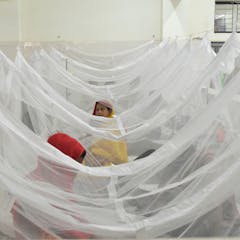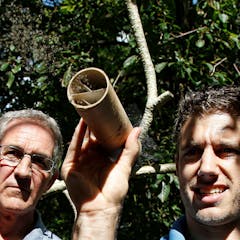
Articles on Dengue
Displaying 1 - 20 of 88 articles

Female mosquitoes don’t want to lay their eggs alone, but they don’t want sites that are too crowded either. Understanding what guides their choice could inform new control strategies.

A new single dose vaccine is expected to be registered with the country’s national health agency by the second half of this year.

Neglected tropical diseases are often associated with social exclusion as well as physical suffering. One billion people around the world suffer from these diseases.

Climate change is causing dengue-carrying mosquitoes to spread. Could the disease become endemic in Europe?

The Sahel region is grappling with an outbreak of the deadly mosquito-borne disease.

Something unusual seems to be happening with dengue, a potentially fatal mosquito-borne viral disease.

Methods that don’t rely on insecticides are needed to bolster the fight against mosquito-borne diseases.

While Nigeria has made progress in controlling some neglected tropical diseases, it should do more as it carries a heavy burden of these diseases.

The human population has doubled in 48 years, and worsening climate change has left the world facing serious health risks, from infectious diseases to hunger and heat stress.

France experienced its largest outbreak of ‘native’ dengue this summer. Thanks to climate change, Europe can expect more of the same.

It is estimated that half of world’s population is at risk of being infected by an arbovirus.

Certain viruses like dengue and Zika can make their hosts smell tastier to mosquitoes. Luckily, vitamin A and its derivatives may help combat these odor changes.

After health systems collapsed due to COVID, India’s hospitals are once again buckling, but this time due to Dengue.

Backyard mosquitoes can be more than just annoying pests. Their bites can spread the pathogens that make us sick.

CC BY-NC-ND10.4 MB (download)
About 98% of mosquitoes aren't harmful to humans. We need to learn to deal with those that are.

A warming climate may change the types of viruses that thrive. A new report suggests that the threat of malaria may be replaced by dengue, for which there is no treatment and no cure.

With all the attention focussed on combating the spread of COVID-19 it’s easy to forget the other health challenges that could affect us all.

Gene drive guarantees that a trait will be passed to the next generation. But should society use this tool to control insect populations?

Release of GM mosquitoes in Florida is imminent. But a multidisciplinary team of scientists believe that more studies are needed first. They encourage a publicly accessible registry for GM organisms.

The pandemic coincides with the long rainy season in Kenya. Rain increases mosquito breeding sites, vector density and thus transmission of mosquito-borne diseases.
